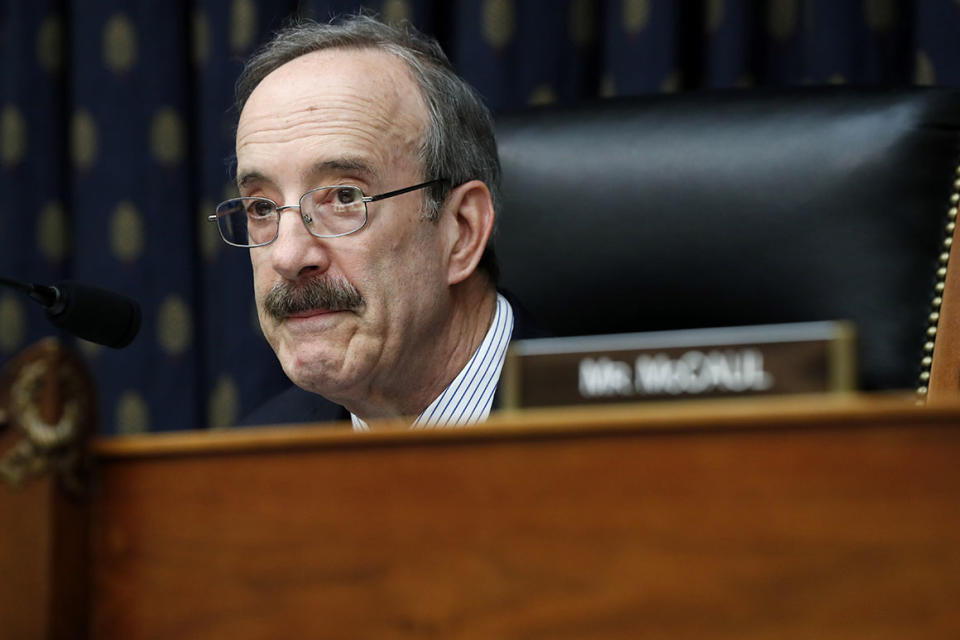Top Democrats vow to release details from closed-door impeachment probe
Top Democrats vowed on Sunday to begin disclosing key confidential details of their investigation into President Donald Trump, signaling the start of a far more contentious phase of the House’s impeachment inquiry.
“Starting this week, we are going to release these transcripts for people to see and read for themselves,” Rep. Jim Clyburn (D-S.C.), the House majority whip, said on CNN’s “State of the Union.” “We will get to the bottom of this, and then we’ll be able to make a determination at that time whether or not something happened that was treasonous.”
Clyburn added the House will begin holding televised hearings in the next two weeks, signaling Democratic investigators have secured enough evidence against Trump to proceed with a public rollout — even with the fate of certain witnesses’ testimony this week still uncertain.
The chairman of the House Foreign Affairs Committee, Rep. Eliot Engel (D-N.Y.), added investigators plan to interview their final witnesses this week, in what could be the last closed-door hearings of the impeachment inquiry into whether Trump sought to manipulate Ukrainian officials to aid his own 2020 reelection bid.
“Everything else is going to be public,” Engel told ABC’s “This Week” on Sunday.
“This week, we'll have the last of the witnesses come in,” Engel said. “Then, it will be released, the transcripts will be released. Everything is transparent.”

Rep. Jackie Speier (D-Calif.), who sits on the House Intelligence panel, said she expected all of the transcripts to be released within the next five days.
"They're going to be very telling to the American people," Speier said on CBS' "Face the Nation." "There is no question now whether there was a quid pro quo, and now the question the Republicans are trying to throw out is, 'Well, was there corrupt intent?'"
The shift to releasing transcripts and holding blockbuster hearings will likely turn the month of November into the most critical point of the House’s probe into Trump — decision time for Democrats on whether they will vote to impeach the president.
Still, House Majority Leader Steny Hoyer would not commit his caucus to a timeline for public hearings.
"Time is not constraining us," the Maryland Democrat said. "The truth and the facts are constraining us. We are going to move as soon as the facts and the truth dictate that we have.
"I don't know what witnesses are going to come forward, what they're going to say, what evidence will have to be pursued," Hoyer said.
As they inch closer to a potential vote on impeachment, Democrats have pointed to new polling that shows a surge in public support, including among independent voters, for their caucus' fast-moving impeachment probe.
Fifty-three percent of people said they approved of Democrats’ inquiry, compared with 44 percent of people who disapproved, according to an NBC News/Wall Street Journal poll released Sunday. And in an ominous sign for the president, 49 percent of people said Trump should be impeached and removed from office — up from 43 percent in the same poll last month. That is the same percentage that supported the impeachment and removal of Trump in a Fox News poll also released Sunday.
"I have been watching the polls all over the country," Clyburn said on CNN, adding, "A majority of [independents] seem to be in favor of moving forward, and certainly overwhelmingly Democrats."
House Speaker Nancy Pelosi also referenced the polling in a "Dear Colleague" letter Saturday night, noting that surveys had "shifted from 59/34 opposed to impeachment when the inquiry was officially announced to 49/47, not only for impeachment, but also removal from office."
Even as Democrats prepare to go public, investigators continue to battle the White House behind the scenes for access to key witnesses, such as national security aide Robert Blair — who participated in the July 25 call between Trump and the Ukrainian president — who has been blocked from appearing on Capitol Hill on Monday. Outgoing Energy Secretary Rick Perry also said Friday he wouldn't testify, ignoring a congressional subpoena.
Most Democrats have returned to their districts this week for recess, though the caucus' leading investigators will remain in Washington for several days of planned closed-door depositions. It is unclear, however, whether the witnesses will appear.
Democrats are also working to secure testimony from former national security adviser John Bolton — potentially a key player who House Intelligence Committee member Rep. Jim Himes (D-Conn.) said Sunday he believed had been subpoenaed.
Republicans, meanwhile, struggled to defend Trump on the substance of the allegations — whether there was a “quid pro quo” meant to exchange held-up military aid to Ukraine for dirt on former Vice President Joe Biden.
House Minority Whip Steve Scalise said Trump’s call “was not talking about the 2020 election or political opponents,” though the administration's partial call record specifically shows Trump brought up Biden’s son.
“It was about what happened prior in 2016, corruption in Ukraine,” the Louisiana Republican said. “The law requires the president to certify that a country before they get foreign aid is actually taking steps to root out corruption.”
White House adviser Kellyanne Conway said Sunday she did not know whether the Trump administration held up military aid to leverage it for the investigation and instead stressed Ukraine had ultimately received the aid.
“I don’t know, but I know they got that aid,” Conway said on CNN's "State of the Union." "Here's what's absolutely, unimpeachably true: Ukraine has that aid.”
Conway did not answer questions about whether the White House would allow officials such as Bolton to testify.
“The president has every right to exert executive privilege for a number of administration officials, current or former,” Conway said when asked about Bolton. “We as a White House will continue to exert executive privilege where we feel it is necessary.”

